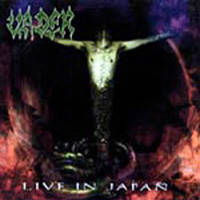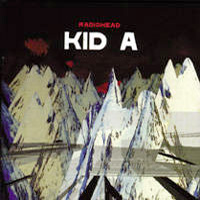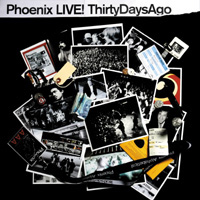 Phoenix
Phoenix
Live! Thirtydaysago (Astralwerks)
An interview with vocalist Thomas Mars and bassist Deck D’Arcy
By Tim Den
My GOD how this band has made me its dance slave, and I NEVER, EVER dance, mind you. French electronica pop is seriously becoming my new addiction. Phoenix, arguably the best out of their countrymen (don’t give me that Air/Stereolab/Stereo Total jive: Even Tahiti 80 are better than any of them), reinterpret their classy studio recordings on this here live disc, transforming into a genuine party machine right in front of your disbelieving ears. If you thought tracks like “Too Young” and “Everything is Everything” were soul-liberating in their original forms, wait until you hear the band rework them suckuhs into a frenzy. Bridges are extended – replete with crowd participation, bass-and-drum-only breakdowns, honest-ta-god rock ‘n’ roll screaming – bad ass drum fills are laid down, and tasty R&B grooves become living breathing succubae that squeeze every bounce of FUNK outta ya. Imagine French pop with spacey synths, now add Parliament beats, Blur guitar lines, and some electronica flourishes, and you’ve got Live! Thirtydaysago. Just when I thought Phoenix couldn’t win me over any further, they tease the shit out of me with this thing. Now I’ve got the biggest woody to see them in the flesh, and you will too.
You’re playing larger and larger venues in the States, how’ve the responses here been?
Thomas: Very good. We’re surprised because I’m not sure if a lot of people download our music or something, cuz every time we play here, we have a lot of people come to the shows. On this tour, we’re playing sold out, 1500-capacity venues in places like Virginia – but only sell 100 CDs per show. So there’s this disconnection. I don’t know if people are discovering us and coming to the shows, but I think almost every person who has our records is coming out. There is a strong link, and the people who listen to our music really “know” us. We want to work on this close relationship with the fans.
Are you playing even bigger places in Europe?
Thomas: It depends. The biggest places we’ve played were summer festivals. And I hate summer festivals.
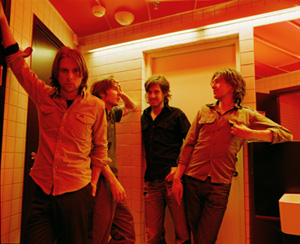 How come?
How come?
Thomas: They’re very impersonal. You feel like you’re working at a factory or something. You’re playing in front of people eating sandwiches. It’s very different from a club, where the atmosphere is very wet and you can communicate with the people. At 2pm, you cannot ask a band to be in shape.
How many times have you toured the States?
Thomas: Twice (both for Alphabetical). We regret the fact that we didn’t tour the U.S. behind United, but it’s making right now exciting because a lot of people are coming to see us saying “We’ve been waiting four years.”
Lost in Translation definitely helped expose you guys to a lot of potential American fans.
Thomas: Yeah, but it’s weird, cuz something like that has a strong impact in one country but not another.
It’s how I heard you for the first time.
Thomas: It’s better than being in an advertisement, I think. For us, a French band, it was the best way to be discovered, because massive radio won’t play you unless you’re living here and building something all the time. Everyone told us that you have to spend four, five months here to be known…
The people who knew us before the movie felt like the movie was theirs because they knew the soundtrack. For me, the movie felt like it belonged to me cuz I was listening to My Bloody Valentine a lot (at the time), our friend Sebastian is on it, Air is on it…
Did you guys get on the soundtrack because of Air?
Deck: No, we’ve known Sophia (Coppola; director) for a long time, and she just asked us. We said “of course!”
You were Air’s backing band for a while, right?
Deck: Yeah, for three weeks.
That’s it!?
Deck: It was a big story, but it was only three weeks. Three weeks of big fun!
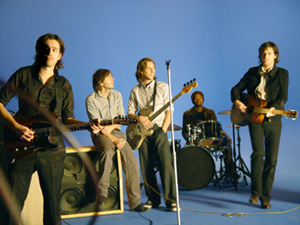 Right now, with you guys, Tahiti 80, Stereolab, and Air, the French scene seems to be full of amazing bands.
Right now, with you guys, Tahiti 80, Stereolab, and Air, the French scene seems to be full of amazing bands.
Deck: After 1997, when Daft Punk and Air came out, there were a shitload of crappy bands who were copiers and followers. But now they’re all gone, and I hope what remains is the good stuff.
Thomas: I think the musicians stayed, because all those other guys were just sampling music. And when the sampling era was over, they all started to try and play instruments, but a lot of them never managed to learn. The scene is getting back to real musicians.
What inspired you to start playing music?
Deck: We’ve known each other for 20 years and had always wanted to play. It was our childhood dream. But living in Paris is very different from living in New York or L.A., which are very musical places. Musical influences are filtered from a distance, and we had the image of what was happening abroad, but I think the distance helped us develop our own thing. Paris, to us, is not a great place to create music. It’s not “plugged in.”
Thomas: But I think it makes it more exciting because you don’t try to reproduce things that already exist. At some point, we had an obsession with not having any references or any smallest sound that already exist on a record. It helped us develop something more personal and maybe attractive to people, because it was another version of something. On the other hand, we’re a bunch of guys from Paris, and we have to fight to get credibility in the U.S. and UK.
You guys record, produce, and mix your own albums, right?
Deck: Yeah, it’s the easiest way for us do what we want to do.
They sound fantastic! Are you guys sound engineers?
Deck: No, once again, it’s just an attempt to be more original.
Thomas: I think we’re just kind of nerdy. We’re nerdy when it comes to the studio.
Deck: We’ve always recorded ourselves. We tried working with an engineer once, but they’re too focused on what they’re doing. We thought about working with an old school guy, but I don’t think it’s gonna happen.
And is it a conscious decision to not have a permanent drummer?
Thomas: No, I actually played drums on United and some on Alphabetical. I think the four of us are already four strong personalities. We never have to explain anything to each other. When you have to start explaining something – sound engineering or drums – you start to analyze your own music and understand its mechanisms, which is something we really want to avoid. We really want to keep the mystery.
The live album is incredible. It literally reinterprets the songs into a “live” setting. Do you think your next album will be more of a “in the flesh” approach because of it?
Thomas: We don’t know what it’s going to sound like because, right now, we’re fascinated by a lot of different musical styles. We’ve changed our way of doing music because now we’re writing music that you can just play on the piano or put on a sheet. If the song is good and strong enough that way, then you can put it in any kind of surrounding. Alphabetical was very different. It was based more on the sounds we got on the recording.
Having been to the States twice now, what do you think about it? Especially with the whole Freedom Fries thing…
Deck: Actually, no problem at all. Everyone’s so nice and kind to us. Surprisingly, very good. Even in all the Red States, they’re all really cool. We spent a week in Texas, which is supposed to be not good for French people, but everyone was great.
Thomas: A lot of people are ashamed of their government, and they want to communicate that to us. The good thing is that we only get the “49%” at our shows. (laughs)
(www.astralwerks.com)


